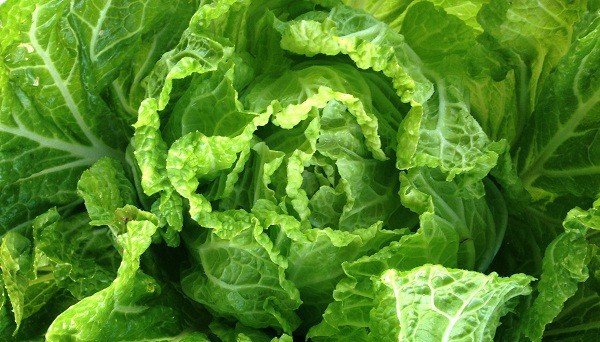Chinese cabbage

Also known as salad cabbage is a plant that, as its name suggests, originates from China. There, this variety was cultivated and selected as early as the 5th century AD, after which it quickly gained popularity in Japan, Korea and Southeast Asia. In Europe and the USA, this type of cabbage became popular relatively recently.
The main difference between different varieties of cabbage is the shape and structure of the leaves. The cobs of the Chinese varieties are elongated, with tight-fitting leaves, white and fleshy at the beginning and light green and delicate in its upper part, and in taste it is not at all inferior to the white. Chinese cabbage does not have such a well-formed cob, which allows it to be used almost entirely.
Nutritional value in 100 grams
• Proteins – 1.2 grams;
• Fats – 0.2 grams;
• Carbohydrates – 2 grams;
• Mineral composition – 0.9 grams;
• Water – 94.8 grams;
• Caloric content – 13 kilocalories;
Chinese cabbage – useful properties
The usefulness of the Chinese cabbage variety is determined by the wide range of vitamins and trace elements contained in its leaves.
Its leaves have been found to contain B vitamins, vitamin A, C, E, K. It also contains iodine, manganese, copper, zinc, phosphorus, iron, magnesium and potassium.
Chinese cabbage is a good mood food. With its help one can get rid of:
• Fatigue;
• Fatigue;
• Lack of appetite;
• Irritability;
• Hair loss;
Thanks to its low calorie content, Chinese cabbage is an indispensable component of most diets for weight loss and cleansing the body of toxins.
Its presence in the diet successfully helps prevent headaches, depression, nervous disorders, diabetes.
It can also be used to prevent the occurrence of cardiovascular diseases, in particular atherosclerosis and hypertension.
The vegetable fibers contained in the leaves of this variety of cabbage have a beneficial effect on intestinal function – this vegetable is recommended for ulcers and gastritis.
The phytoncides that make up the cabbage juice help with inflammatory diseases and the treatment of purulent wounds.
In the homeland of this variety of cabbage, as well as in Japan, it is considered one of the sources of longevity.
This is due to the large amounts of the specific amino acid lysine contained in the leaves of the Chinese cabbage – it cleanses the blood by dissolving foreign proteins, thus directly affecting immunity.
The compound lactucin is also found in the leaves, which has a beneficial effect on metabolism, normalizes pressure and strengthens the walls of blood vessels.
In addition, Chinese cabbage works by stimulating the formation of red and white blood cells, which is very important in anemia, and also in this way regulates blood cholesterol levels, reduces the likelihood of tumors and protects the liver from fatty degeneration.
Another valuable property of this vegetable is its ability to remove heavy metals and radionuclides from the body.
Contraindications
The consumption of Chinese cabbage is contraindicated in case of increased acidity, bleeding in the gastrointestinal tract, in case of exacerbation of various diseases of the stomach and intestines, such as pancreatitis.
Frequent overeating of this vegetable can cause diarrhea, nausea and headache.
All varieties of cabbage do not mix well with dairy products, and when consumed at the same time, they can cause intense stomach upset.



